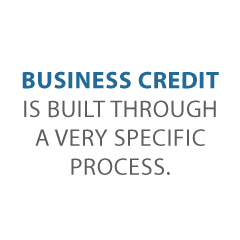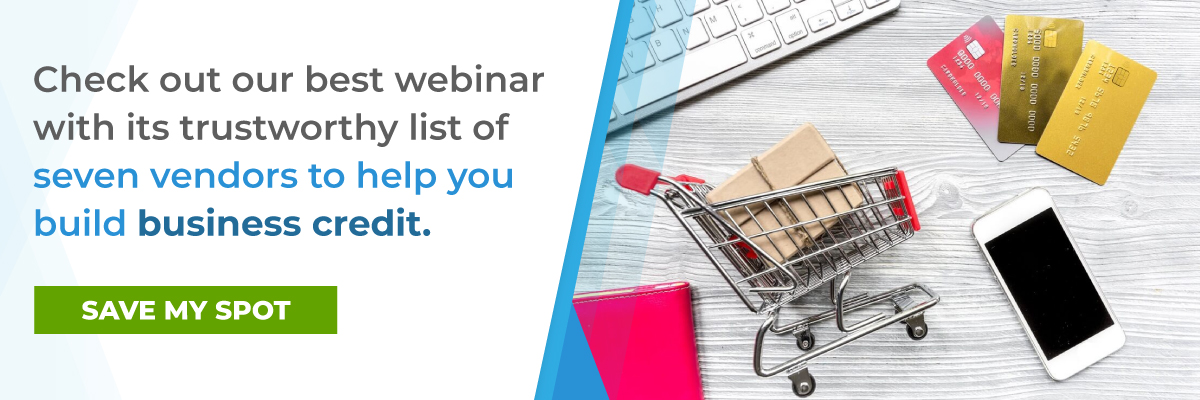- Connect With Us!
- (877) 600-2487
- info@creditsuite.com
How Do I Build Business Credit? A Step-by-Step Guide
Published By Faith Stewart at February 27th, 2020
Building business credit is entirely different from building personal credit. With personal credit, it simply builds passively as you use credit throughout the course of your life. Business credit is a different story. You have to actively take steps to ensure that your business transactions are reported on your business credit report, not your personal credit report.
How Do I Build Business Credit? 3 Definitive Steps for Building Business Credit
When you ask yourself how do I build business credit, you have to understand that business credit works differently than personal credit. For example, unlike personal credit, there are at least 3 distinct steps you need to take to build business credit. However, it can be helpful to first understand the relationship between business credit and fundability. This will provide much needed perspective as you work through each step.
Check out our best webinar with its trustworthy list of seven vendors to help you build business credit.
How Do I Build Business Credit? The Relationship Between Fundability and Business Credit
Business credit is important to the fundability of your business. However, it is not the sole source of your business fundability. A foundation of fundability is necessary for business credit, and business credit is necessary for fundability. If you have poor business credit, your business cannot be fundable. Likewise, if your business is not set up to be fundable, you will not be able to build business credit. So, now you are really asking yourself, how do I build business credit?
How Do I Build Business Credit Step 1: The Foundation of Fundability
If you ever want your business to be fundable on its own, apart from you, it must be set up in this way. That’s not to say that your personal credit will not ever affect fundability, but if you do not set your business up to be a separate entity, business credit will never even be on the table.
Like any foundation, it is best to start at the beginning. It will be faster and easier if you do. However, if your business is already up and running, you may not have that option. That’s okay. It’s never too late to start, but start now. The longer you wait the harder it will be, for several reasons. How do you set up a fundable foundation?
Separate Contact Information
The first answer to the question of how do I build business credit, is to separate your business from yourself. One step in this process is to make sure you and your business have separate contact information. Your business needs its own phone number, fax number, and address. That doesn’t mean you have to get a separate phone line, or even a separate location. You can still run your business from your home. You don’t even have to have a fax machine.
In fact, you can easily get a business phone number and fax number that will work over the internet instead of phone lines. Even better, the phone number will forward to any phone you want it too so you can simply use your personal cell phone or landline. Whenever someone calls your business number it will ring straight to you.
Faxes can be sent to an online fax service, if anyone ever happens to actually fax you. This part may seem outdated, but it does help with appearances.
You can use a virtual office for a business address. This isn’t what you may think. it is a business that offers a physical address for a fee, and sometimes they even offer mail service and live receptionist services. Also, there are some that offer meeting spaces for those times you may need to meet a client or customer in person if you do not have a place.
Get an EIN
The next thing you need to do is get an EIN for your business. This is an identifying number that works in a way similar to how your SSN works for you personally. Some business owners use their SSN for their business. However, it really doesn’t look professional to lenders, and it can cause your personal and business credit to get all mixed up. When you want to work on fundability and business credit, you need to apply for and use an EIN. You can get one for free from the IRS.
Make Sure You Incorporate
Incorporating your business as an LLC, S-corp, or corporation is necessary to both fundability and business credit. It lends credence to your business as one that is legitimate. It also offers some protection from liability.
Which option you choose does not matter as much for fundability as it does for your budget and needs for liability protection. The best thing to do is talk to your attorney or a tax professional. What is going to happen is that you are going to lose the time in business that you have. When you incorporate, you become a new entity. You basically have to start over. You’ll also lose any positive payment history you may have accumulated..
This is why you have to incorporate as soon as possible. Not only is it necessary for fundability and for building business credit, but so is time in business. The longer you have been in business the more fundable you appear to be. That starts on the date of incorporation, even if you were in business before that time.
Open a Business Bank Account
You have to open a separate, dedicated business bank account. There are a few reasons for this. First, it will help you keep track of business finances. It will also help you keep them separate from personal finances for tax purposes.
Also, there are several types of funding you cannot if you do not have a business bank account. Many lenders and credit cards want to see one with a minimum average balance. In addition, you cannot get a merchant account without one. That means, you cannot take credit cards payments. Studies show consumers typically spend more when they can pay by credit card.
Pay Attention to Licensing Requirements
For a business to be legitimate it has to have all of the necessary licenses it needs to run. If it doesn’t, red flags are going to fly up all over the place. Do the research you need to do to ensure you have all of the licenses necessary to legitimately run your business.
Make Sure Your Website is Professional
How can a business website can affect you ability to get funding? These days, you do not exist if you do not have a website. However, having a poorly put together website can be even worse. It is the first impression you make on many, and if it appears to be unprofessional it will not bode well for you with consumers or potential lenders.
Spend the time and money necessary to ensure your website is professionally designed and works well. Pay for hosting too. Don’t use a free hosting service. Along these same lines, your business needs a dedicated business email address. Make sure it has the same URL as your Website. Don’t use a free service such as Yahoo or Gmail.
How Do I Build Business Credit Step 2: Get Accounts Reporting
This is the part that a lot of business owners miss the boat on. It isn’t easy to get credit in the name of your business when you don’t have credit to begin with. There are a few tips that can help you jump over this hurdle however. Once you break this wall down, you can work your way up through the credit tiers.
Check out our best webinar with its trustworthy list of seven vendors to help you build business credit.
The other part that is missed by many is that you have to have a D-U-N-S number for this to work. Dun & Bradstreet is the largest and most commonly used business credit reporting agency, and if you do not have a D-U-N-S number, you do not have a file with them. If payments are reporting to them and there is no corresponding D-U-N-S, the payments will not be counted. To build business credit you absolutely have to have this number. Find out more about building business credit with D&B here.
Tip 1: Ask Current Vendors to Report Payments to Credit Agencies
Vendors you already have a relationship with may be willing to extend credit without a credit check. If not, they may offer net 30 terms on invoices. They don’t have to, so you will have to ask. The worst that can happen is they say no. If they say yes, ask them to report the payments to the business credit agencies.
Tip 2: Ask Utility Providers to Report Payments
You pay things like utilities, rent, and internet each month anyway. Ask those providers to report your payments to the business credit reporting agencies. If they say yes, make sure your accounts are set up in your business name with your business contact information. Again, the worst they can say is no.
Tip 3: Work with Starter Vendors in the Vendor Credit Tier
How do I build business credit? Starter vendors are the business credit building secret that most business owners are unaware of. There are certain vendors, known in the business credit building world, as starter vendors. These are part of what we like to call the vendor credit tier. They are certain retailers that will extend Net 30 terms in your business name without a credit check. Then, after you pay, they will report those payments to the business credit report agencies (CRAs).
This is how you can get the ball rolling with business credit. Since they do not check your credit score, it doesn’t matter than you do not have one. Of course, they do have other risk reducing techniques in place. These vary by vendor. Here are a few such starter vendors to help you get started. When you ask yourself how do I build business credit, starter vendors are a huge part of the answer.
Quill Office Supplies
Quill sells office supplies as well as cleaning and packaging supplies. Products range from office furniture and printer ink to snacks and coffee.
They report to D&B. If you do not already have a PAYDEX score, you will have to place an initial order first. Generally speaking, they establish a 90-day prepay schedule, and if you order each month for three months, they will most often approve you for a Net 30 account.
Go here to get started with Quill.
Grainger Industrial Supply
Grainger sells power tools, pumps, hardware and other things. In addition, they can handle maintenance of your auto fleet. You need a business license and EIN to quality, as well as a D-U-N-S number.
You can apply by fax or over the phone. If you need less than $1,000 in credit, you only need a business license for approval. For over $1,000, you will need trade and bank references.
If you are just starting out and do not have references, the $1,000 is plenty to get you started building your business credit. Check them out here.
Behalf.com
Behalf is way of getting paid through an app, but they also offer funding. The more you have your customers pay you through Behalf, the more likely Behalf is to offer you favorable terms when it comes to funding.
Funding can be through purchase financing or a virtual Mastercard option. Terms run from Net 30 to 180 days, and they report to Dun & Bradstreet, Experian, and Equifax. This fact alone, that they report to all the major credit reporting agencies, makes them an extremely valuable tool in building business credit.
Find out more here.
After you have 8 or so of these types of accounts reporting payments to your business credit report, you should have a strong enough score to move on to the next tier. We call this the retail credit tier. They are retailers as well, but offer more traditional credit. These are credit cards for use at specific stores such as Office Depot or Lowes. This is also sometimes referred to as store credit.
After you have several of these store credit account reporting, you can apply for cards in the fleet credit tier. These are gas cards with companies such as Shell and Fuelman. They can be used for fuel and auto repair and maintenance only.
Lastly, with accounts reporting from all these tiers, you should have a score strong enough to apply for cards from what we call the cash credit tier. Of course, that is only if you have been making payments consistently on time.
These are traditional credit cards that are not attached to a specific store or tied down to certain types of purchases. They can be used for anything and everything. In addition, they often have better interest rates and nice rewards programs.
How Do I Build Business Credit Step 3: Credit Monitoring
The last step in building business credit sounds kind of passive, but it is in fact very active and very important. You must actively monitor your business credit reports for a number of reasons. First, you need to see that all accounts are reporting. Not only that, but you need to see how many you have reporting so you know when to move on to the next tier.
Check out our best webinar with its trustworthy list of seven vendors to help you build business credit.
Other than that, you have to monitor your report to ensure you get any mistakes corrected and that all information is updated as needed. You must request corrections in writing, and send copies of supporting documentation. You can monitor with the CRAs directly, but we can help you monitor with D&B and Experian here for a fraction of the cost.
How Do I Build Business Credit? One Step at a Time
Business credit is built through a very specific process. It isn’t hard, but it isn’t passive either. It does take effort. You have to ensure your business is set up to be fundable. In addition, you have to know where to go to get accounts reporting initially. After that, it’s all about making wise decisions and managing your credit responsibly.
Don’t forget, business credit is just one part of overall fundability. Learn more about what else can affect fundability here.

 " class="attachment-blog-single size-blog-single wp-post-image" alt="Get Business Credit Cards for New Businesses Credit Suite-Business Line of Credit Decoded" title="Get Business Credit Cards for New Businesses">>
" class="attachment-blog-single size-blog-single wp-post-image" alt="Get Business Credit Cards for New Businesses Credit Suite-Business Line of Credit Decoded" title="Get Business Credit Cards for New Businesses">>